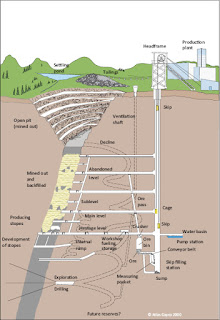The metals and mining sector is the industry dedicated to the
location and extraction of metal and mineral reserves around the world.
Global reserves of metals and minerals are mined for profit and then used in jewelry-making, industrial
applications
The Egyptians and Sumerians smelted gold and silver from ore 6,000 years
ago. As a result, these metals began to have a value that was transferable
between people and between cultures. Approximately 5,500 years ago in this history of mining
The first recorded account of mining in India was in 1774, when the East India Company granted permission to a British entity, M/s Sumner and Heat, for mining coal in Raniganj Coal Field along the river Damodar in West Bengal.
Minerals
Along with 48.83% arable land, India has significant sources of coal (fourth-largest reserves in the world), bauxite, titanium ore, chromite, natural gas, diamonds, petroleum, and limestone. According to the 2008 Ministry of Mines estimates: 'India has stepped up its production to reach the second rank among the chromite producers of the world. Besides, India ranks 3rd in production of coal & lignite, 2nd in barites, 4th in iron ore, 5th in bauxite and crude steel, 7th in manganese ore and 8th in aluminium.'
India accounts for 12% of the world's known and economically available thorium. It is the world's largest producer and exporter of mica, accounting for almost 60 percent of the net mica production in the world, which it exports to the United Kingdom, Japan, United States of America etc. As one of the largest producers and exporters of iron ore in the world, its majority exports go to Japan, Korea, Europe and the Middle East. Japan accounts for nearly 3/4 of India's total iron ore exports. It also has one of the largest deposits of manganese in the world, and is a leading producer as well as exporter of manganese ore, which it exports to Japan, Europe (Sweden, Belgium, Norway, among other countries), and to a lesser extent, the United States of America.
Production
The net production of selected minerals
given in the table below:
| Mineral | Quantity | Unit | Mineral type |
|---|---|---|---|
| Coal and lignite | 683 | Million tonnes | Fuel |
| Natural Gas | 32,249 | Million cubic metres | Fuel |
| Crude oil | 36.9 | Million tonnes | Fuel |
| Bauxite | 28.134 | million tonnes | Metallic mineral |
| Copper | 3.9 | Million tonnes | Metallic mineral |
| Gold | 1594 | kilogram | Metallic mineral |
| Iron ore | 156 | Million tonnes | Metallic mineral |
| Lead | 145 | Thousand tonnes | Metallic mineral |
| Manganese Ore | 2148 | Thousand tonnes | Metallic mineral |
| Zinc | 759 | Thousand tonnes | Metallic mineral |
| Diamond | 31836091 | Carats | Non-metallic mineral |
| Gypsum | 3,651 | Thousand tonnes | Non-metallic mineral |
| Limestone | 170 | Million tonnes | Non-metallic mineral |
| Phosphorite | 1,383 | Thousand tonnes | Non-metallic mineral |
Major mining
companies in India
·
National Mineral Development
Corporation. ...
·
Vedanta. ...
·
Hindustan Zinc. ...
·
Hindustan Copper. ...
·
Hindalco Industries.
...
·
Bharat Aluminium Company.
...
·
Rajasthan State Mines and
Minerals. ...
·
Gujarat Mineral Development
Corporation
We
are a one-stop-solution provider as an Underground Coal And Metal Mining Company. Our vast range of works includes proper planning, mine
designing, constructing infrastructure along with supplying, operating and
maintaining all Rig machineries and equipments, to finally exploiting the
mineral of desire
First metel mined
Initially, many metals were obtained through open-pit mining, and ore was primarily extracted from shallow depths, rather
than through deep mine shafts. Around the 14th century, the growing
use of weapons, armour, stirrups, and horseshoes greatly increased the demand
for iron
The metals of
antiquity are the seven metals which humans had identified and
found use for in prehistoric times: gold, silver, copper, tin, lead, iron, and
mercury
humans start using
metal
5000 years BC
Ancient man first found and began using Native Metals approximately 5000 years BC. Over the next 2000 years, leading up to the Bronze age, man mastered how to find, manipulate and use these native metals in better ways and in a range of applications. Nuggets of gold were often the easiest to find.










0 Comments